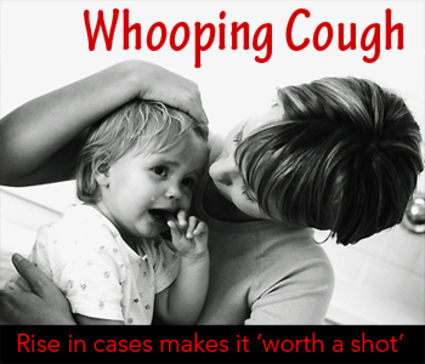Whooping cough outbreak worst in 50 years
Last updated 11/28/2010 at Noon
Houston- Harris County health officials have confirmed an outbreak of whooping cough at a northwest Harris County preschool. Seven children have the highly contagious bacterial infection, a Harris County health department spokeswoman said.
School has been out for the week of Thanksgiving, health officials believe they’ll be able to keep the disease from spreading. It is the Houston area’s first cluster of cases.
The number of cases of whooping cough continue to grow. Federal officials say is the worst outbreak of the disease in 50 years. Texas ranks second in the number of cases reported nationally.
The Centers for Disease Control have published their latest report in November showing 21,133 cases of pertussis/whooping cough for 2010.
Whooping cough, also known as pertussis, is a highly contagious illness. It has symptoms similar to the common cold, but a persistent cough lasting for weeks is an indicator of the illness.
Whooping cough is epidemic in California, where there have been 6,795 cases reported, the most since 1958. Texas is second with 2,229. Following in order are Ohio with 1,461; Michigan with 1,165; Minnesota with 698; and Pennsylvania with 677 cases this year. These six states represent 62 percent of all the cases reported nationally.
While pertussis can affect people of any age and in fact, national rates have been rising in adults, it is the infants who adults pass this on to who bear the burden. The CDC points out that infants and children under 12 months of age are most at risk from serious complications due to catching whooping cough. More than half in that age group will need to be hospitalized. Twenty percent will have pneumonia. One in 100 may die.
In Oklahoma 66 cases have been reported. Laurence Burnsed, the state Health Department’s communicable disease division director, said the department was keeping an eye on bordering states like Texas.
Ten children have died in California already, and at least 213 children under six months of age have been hospitalized. Whooping cough was a leading cause of illness and death in children in the first half of the 20th century.
The best way to prevent the disease is through vaccinations. The childhood vaccine is called DTaP. The whooping cough booster vaccine for adolescents and adults is called Tdap. Both protect against whooping cough, tetanus, and diphtheria.
Even with the success of whooping cough vaccines, the disease is still common in the United States. Many cases are not diagnosed and so are not reported. Yet over the past 5 years, between 8,000 and 25,000 cases have been reported each year according to the CDC. Institutional outbreaks of whooping cough, such as those in a daycare center, school or hospital, are common, taking place each year in many states.
Vaccination recommendations:
- Infants and children are
recommended to receive 5 doses of the DTaP vaccine at 2, 4, and 6
months, at 15 through 18 months, and at 4 through 6 years. All 5 doses
are needed for maximum protection
- Adolescents are
recommended to receive the Tdap vaccine at their regular check-up at age
11 or 12. If teenagers (13 through 18 years) missed getting the Tdap
vaccine, parents should ask the doctor about getting it for them now
- Adults who are 19
through 64 years old are recommended to get a 1-time dose of Tdap in
place of the Td booster they’re recommended to receive every 10 years.
No need to wait until you are due for your Td booster—the dose of Tdap
can be given earlier than the 10-year mark since the last Td booster.
It's a good idea for adults to talk to a healthcare provider about
what's best for their specific situation.
- Pregnant women should
ideally receive Tdap before pregnancy. Otherwise, it is recommended that
Tdap be given after delivery, before leaving the hospital or birthing
center. If a pregnant woman is at increased risk for getting whooping
cough, such as during a community outbreak, her doctor may consider
giving Tdap during pregnancy. Although pregnancy is not a
contraindication for receiving Tdap, a pregnant woman and her doctor
should discuss the risks and benefits before choosing to receive Tdap
during pregnancy.
- People 65 years and older do
not currently have a whooping cough booster vaccine licensed for their
age group. However, people in this age group can talk to their
healthcare provider to see if getting Tdap is a good decision for them.
This discussion can include weighing the risks and benefits of receiving
Tdap. Receiving Tdap may be especially important during a community
outbreak and/or if caring for an infant.















Reader Comments(0)